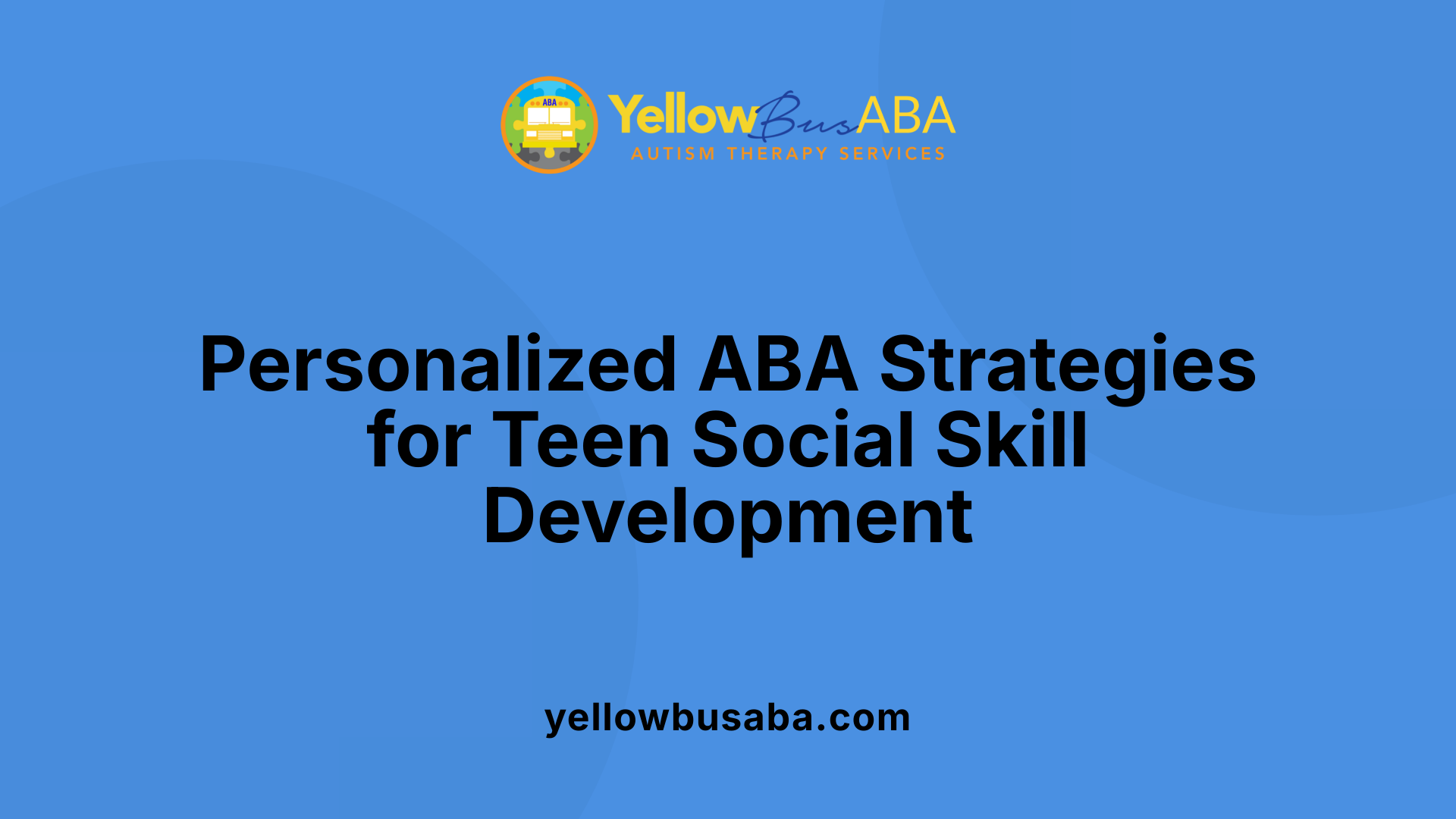Understanding ABA Therapy’s Impact on Adolescents' Social Development
Adolescence is a critical period for social development, particularly for teens with autism spectrum disorder (ASD). ABA therapy, recognized as a leading evidence-based intervention, plays a vital role in fostering social competence during these formative years. Through structured strategies like role-playing, modeling, and reinforcement, ABA provides teenagers with the skills necessary to navigate complex social landscapes, build meaningful relationships, and increase their confidence.
Core Techniques Used in ABA to Cultivate Social Skills

What are the key techniques used in ABA therapy to enhance social skills?
Applied Behavior Analysis (ABA) therapy employs a range of proven methods to improve social interactions in children, particularly those with autism spectrum disorder (ASD). Central to these techniques are role-playing exercises, which simulate real-world social scenarios. These activities give teens a safe environment to practice behaviors such as initiating conversations, sharing, and understanding social cues.
Modeling is another vital strategy. Therapists demonstrate appropriate social behaviors, which teens observe and imitate. This visual approach is especially effective for children who learn best through observation and repetition.
Positive reinforcement plays a crucial role in encouraging desired social behaviors. When a teen displays a skill like eye contact or active listening, they are rewarded with praise or tokens. This motivational approach helps to reinforce good social habits, increasing the likelihood they will be used consistently.
Social stories are used to teach social norms and expectations. These structured narratives help children understand specific social situations, such as greeting others or resolving conflicts, making complex concepts more accessible.
Prompting and fading are techniques that support independence in social responses. Initially, cues or physical prompts guide the child toward correct behavior. Over time, these prompts are gradually reduced, encouraging the child to perform skills more autonomously.
Discrete trial training (DTT) is a systematic method that breaks down social skills into small, manageable components. Each component is practiced intensively, ensuring mastery before moving to more complex interactions.
Throughout therapy, data collection is essential. Tracking each session's progress allows therapists to tailor interventions specifically to the child's needs and adjust strategies for optimal results.
| Technique | Purpose | Example |
|---|---|---|
| Role-playing | Practice real-life social situations | Simulating a restaurant scene |
| Modeling | Demonstrate behaviors for imitation | Showing how to share toys |
| Positive reinforcement | Motivate and solidify social behaviors | Giving praise for eye contact |
| Social stories | Teach social norms and expectations | Explaining greetings |
| Prompting & Fading | Support independence and reduce prompts | Guiding a response, then withdrawing |
| Discrete trial training (DTT) | Break down complex skills into steps | Practicing turn-taking in steps |
| Data collection | Measure progress and adjust plans | Recording responses during sessions |
These techniques form a comprehensive approach to teaching social skills, ensuring each individual’s needs are met through personalized, goal-oriented strategies. Collaboration with parents and caregivers further enhances the generalization and maintenance of social abilities in everyday settings.
For more about ABA therapy techniques for social skills, search for "ABA therapy techniques for social skills."
Benefits of ABA Therapy for Teen Social Development

What benefits does ABA therapy offer for social development in adolescents?
ABA therapy provides numerous advantages for teenagers aiming to improve their social abilities. One of its primary benefits is enhancing both verbal and non-verbal communication skills. Teens learn to answer questions confidently, ask follow-up questions, and use gestures like smiling or nodding to express themselves.
The therapy also emphasizes the importance of understanding social cues, such as facial expressions and body language, which are vital for interpreting others' emotions and intentions. This understanding helps teens respond appropriately in social settings.
Furthermore, ABA helps develop skills for initiating and maintaining conversations. Through structured activities like role-playing and social stories, teens practice starting conversations, taking turns, and sharing, which are essential for forming friendships.
Respect for personal boundaries and effective participation in group environments are also focal points. The therapy encourages teens to recognize and respect others' space and to engage cooperatively with peers.
Emotional regulation is a crucial component, enabling adolescents to identify their feelings and employ coping strategies during social challenges. This resilience supports more confident social interactions.
Family involvement is integral to reinforcement outside clinical sessions. Parents and caregivers are guided to create opportunities for interaction, reinforce skills learned, and generalize behaviors across settings like home, school, and community.
Overall, ABA prepares teens for independent social participation. It equips them with the skills necessary for everyday interactions, promoting confidence, self-advocacy, and the ability to build meaningful relationships. These improvements not only help in social contexts but also lay a foundation for successful transitions into adulthood.
Fostering Social Competence During Adolescence

Why is ABA therapy important for fostering social competence during adolescence?
ABA therapy plays a crucial role in helping teens build essential social skills, particularly for those with autism spectrum disorder (ASD). It uses structured, evidence-based techniques like role-playing, modeling, and reinforcement to teach teens how to interpret social cues, start conversations, and maintain eye contact.
The therapy focuses on breaking down complex social behaviors into manageable steps, making learning more accessible. For example, role-playing exercises provide safe environments where teens can practice real-life scenarios, develop emotional understanding, and refine communication skills.
Personalized goals are established through thorough assessments, and progress is continuously monitored. This ensures that the intervention remains tailored to each teen’s needs, promoting steady development of social independence.
Involving family members and community resources is vital, as it helps reinforce skills learned during therapy and promotes their generalization in everyday settings. This collaboration supports teens in applying their skills outside structured sessions, such as at school or social gatherings.
Addressing social anxiety and emotional regulation is an integral part of ABA. Techniques like gradual exposure and relaxation strategies help teens feel more confident in social interactions.
Overall, ABA prepares adolescents for successful community involvement and adult life by fostering effective communication, emotional awareness, and social self-reliance. It aims to empower teens to make meaningful relationships, participate actively in their communities, and achieve greater independence.
Support Strategies and Techniques for Teen Social Skills

How does ABA therapy support social skill development in teenagers?
ABA therapy helps teens improve their communication and social interactions by teaching specific behaviors using clear and manageable steps. Techniques like role-playing allow teens to practice social responses and emotional regulation in a safe, controlled setting. For example, teens might rehearse how to greet a peer or handle a disagreement calmly.
Modeling is another essential strategy where therapists demonstrate appropriate social behaviors for teens to observe and imitate. Watching a peer interact kindly or asking questions politely provides a visual example that teens can replicate in real life.
Positive reinforcement, such as praise or tokens, encourages teens to repeat socially desirable behaviors. When teens successfully initiate conversation or make eye contact, they might receive a reward, boosting their motivation and confidence.
Visual supports like schedules and communication boards further assist in understanding social expectations. These tools help teens anticipate what will happen next in social situations, decreasing anxiety and promoting active participation.
Group social skills training offers opportunities for peers to practice communication, teamwork, and problem-solving together. Engaging in activities like social stories and role-playing within a group helps teens build friendships and learn social norms.
Natural environment teaching involves practicing skills in everyday settings—at school, home, or in community places—to promote skill generalization. This approach ensures that social behaviors learned in therapy carry over into real-world interactions.
Addressing social anxiety is also a focus. Gradual exposure to social situations, combined with relaxation techniques and individualized strategies, helps teens feel more comfortable and confident.
Family involvement remains crucial. Parents and caregivers can reinforce skills learned in therapy by creating opportunities for interaction, modeling behaviors, and using visual supports during daily routines. This consistent practice supports the generalization and maintenance of social skills.
In summary, ABA therapy employs a variety of engaging techniques—like role-playing, modeling, reinforcement, visual tools, and group activities—that are personalized to each teen’s needs. These methods work together to build social competence, reduce anxiety, and foster meaningful peer and adult relationships, setting a foundation for success in school and future social environments.
Tailoring ABA Interventions for Teenagers with Autism

How can ABA therapy be tailored to support social skills development in teenagers with autism?
ABA therapy for teenagers with autism is highly personalized, ensuring that each teen’s unique needs are met through detailed planning. Initial assessments help identify specific social challenges, such as difficulty interpreting social cues or maintaining conversations. Based on this, therapists develop individualized treatment plans that focus on targeted skills.
A variety of evidence-based strategies are employed to teach these skills effectively. Role-playing exercises create safe, realistic scenarios for practicing social responses. Social stories help clarify social norms and expectations, while video modeling provides visual examples of appropriate behaviors. Peer-mediated interventions encourage interaction with classmates or friends, fostering real-world social experiences.
To ensure skills stick across different environments, therapists break down complicated social behaviors into small steps, teaching each component separately. Reinforcement—such as praise or tokens—is used to motivate teens and reinforce successful social interactions.
Natural environment training plays a vital role in generalizing learned skills. Teens practice social skills during everyday activities, whether in school, at home, or in community settings. Collaboration with parents and caregivers supports this reinforcement outside therapy sessions, helping teens apply social skills in natural contexts.
By carefully adapting strategies to each teen’s interests, developmental level, and specific social difficulties, ABA therapy maximizes its effectiveness. This tailored approach aims to boost confidence, improve communication, and build meaningful relationships that support teenagers’ social growth.
Conclusion: Empowering Teens for Social Success
How does ABA therapy enhance social skills in teenagers?
ABA therapy is a highly structured, evidence-based approach that significantly improves social skills among teens with autism spectrum disorder (ASD). It works by creating personalized programs that focus on social engagement, communication, and building positive behaviors. Techniques such as role-playing, modeling, and social stories allow teens to practice real-life scenarios in a safe environment. Reinforcement strategies motivate the teens to repeat and solidify these skills, increasing their confidence.
The therapy is tailored to each teen’s needs through comprehensive assessments, ensuring that social cues like reading facial expressions, initiating conversations, and turn-taking are effectively targeted. As teens progress, ABA emphasizes generalizing these skills to different environments—home, school, and community—by involving parents, teachers, and caregivers.
Why is family and community involvement crucial?
Family and community involvement play a vital role in reinforcing learned skills outside clinical settings. Parents and caregivers can support social development by creating interaction opportunities, modeling appropriate behaviors, and using visual supports or social stories. Consistent reinforcement in everyday life helps teens transfer skills from therapy sessions to real-world interactions, promoting smoother integration into social settings.
Why is ongoing assessment and skill generalization important?
Continuous evaluation of progress ensures that interventions remain relevant, effective, and tailored. Frequent assessments help therapists adjust goals, introduce advanced social skills, and troubleshoot any difficulties. Promoting skill generalization across settings guarantees that teens can apply their social abilities in various situations, boosting their independence, self-confidence, and ability to form meaningful relationships.
How does ABA prepare teens for real-world social interactions?
By systematically breaking down complex social behaviors into manageable components, ABA equips teens with practical skills needed for everyday interactions. Group social skills training offers opportunities for peer interaction and teamwork, improving collaborative skills and emotional understanding. Techniques like video modeling and peer-mediated instruction provide realistic practice, helping teens navigate social norms confidently.
What is the impact on confidence, independence, and participation?
Effective ABA interventions foster increased self-confidence and independence in teens. As they master social skills, they become more active participants in social and community activities, reducing social anxiety and increasing inclusion. The overall goal is to empower teens to make and keep friends, succeed academically and socially, and advocate for themselves.
| Aspect | Explanation | Impact |
|---|---|---|
| Personalized planning | Tailored interventions based on thorough assessments | Increased relevance and effectiveness |
| Reinforcement strategies | Rewards that motivate social behaviors | Repetition and mastery of skills |
| Family involvement | Parental support for homework, modeling, and reinforcement | Skill transfer and consistency |
| Skill generalization | Applying learned skills across different settings and situations | Increased independence and confidence |
| Continuous evaluation | Regular assessments to guide therapy adjustments | Maintains progress and addresses new challenges |
Fostering Future Success through Structured Support
ABA therapy is a proven and effective approach for helping teenagers develop essential social skills. Its individualized, structured methods, combined with active family involvement and continuous progress monitoring, ensure that teens are equipped with the social competencies necessary for successful interactions, independence, and integration into their communities. As a result, adolescents with ASD and other social challenges can build confidence, form meaningful relationships, and be better prepared for the social demands of adulthood.
References
- How ABA Therapy Helps Teens Develop Social Skills
- Developing Social Skills Through ABA Therapy for Autism
- Enhancing Social Skills Through ABA Therapy
- ABA Therapy for Enhancing Social Skills in Children with Autism
- Harnessing ABA Therapy for Social Skills Development in Autism
- How ABA Therapy Helps With Social Skills
- How ABA Therapy Enhances Social Skills in Children with ASD
- How ABA Therapy Improves Social Skills in Children With Autism
- How ABA Therapy Helps Improve Social Skills in Children
- How ABA Therapy Can Improve Communication Skills in Children


.jpg)
.avif)


